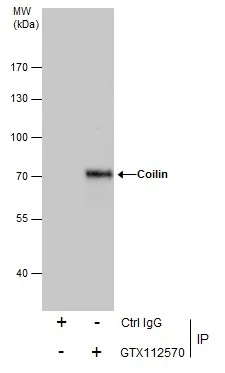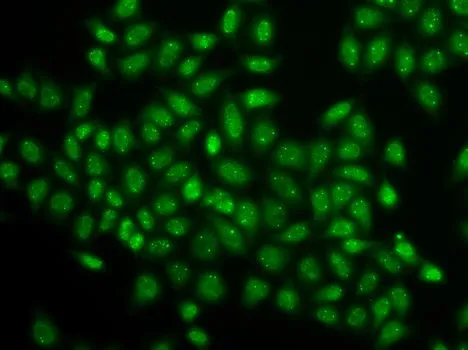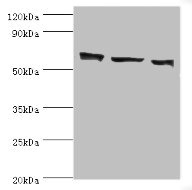Coilin antibody [pdelta]
GTX11822
ApplicationsImmunoFluorescence, Western Blot, ImmunoCytoChemistry
Product group Antibodies
ReactivityHuman
TargetCOIL
Overview
- SupplierGeneTex
- Product NameCoilin antibody [pdelta]
- Delivery Days Customer9
- Application Supplier NoteWB: 1-2 microg/ml. *Optimal dilutions/concentrations should be determined by the researcher.Not tested in other applications.
- ApplicationsImmunoFluorescence, Western Blot, ImmunoCytoChemistry
- CertificationResearch Use Only
- ClonalityMonoclonal
- Clone IDPdelta
- Concentration~1.5 mg/ml
- ConjugateUnconjugated
- Gene ID8161
- Target nameCOIL
- Target descriptioncoilin
- Target synonymsCLN80, p80-coilin, coilin, coilin p80, p80
- HostMouse
- IsotypeIgG1
- Protein IDP38432
- Protein NameCoilin
- Scientific DescriptionThe description of specific intranuclear structures known today as Cajal bodies was first published in 1903 by the neuro-cytologist Ramon-y-Cajal. He observed that neurons stained with silver contained spherical structures of around 0.5 micron in diameter that were often associated with nucleoli and called them nucleolar accessory bodies. Later, the same bodies were called coiled bodies since when these structures were viewed by electron microscopy, they resembled a tangle of coiled threads. It was found that patients with autoantibodies against coiled bodies recognize a protein of 80 kDa termed p80-coilin. Using these antibodies, coiled bodies were identified in plants, flies, frogs, birds, and mammals. The gene encoding p80-coilin has been cloned and sequenced. It contains two nuclear localization sequences (NLS) (at amino acid 107-112 and 181-198) and several serine residues that are phosphorylated in vivo. Mutating Serine-202 to Aspartate causes the disappearance of coiled bodies and a redistribution of coilin to intranucleolar domains. Nuclear antigens shown to colocalize with p80 coilin in Cajal bodies include basal transcription factors, cell cycle factors (cdks), splicing snRNPs and nucleolar factors including snoRNPs.
- ReactivityHuman
- Storage Instruction-20°C or -80°C,2°C to 8°C
- UNSPSC12352203
References
- Benoit Bouvrette LP, Wang X, Boulais J, et al. RBP Image Database: A resource for the systematic characterization of the subcellular distribution properties of human RNA binding proteins. Nucleic Acids Res. 2023,51(D1):D1549-D1557. doi: 10.1093/nar/gkac971Read this paper
- Van Nostrand EL, Freese P, Pratt GA, et al. A large-scale binding and functional map of human RNA-binding proteins. Nature. 2020,583(7818):711-719. doi: 10.1038/s41586-020-2077-3Read this paper





![HeLa whole cell and nuclear extracts (30 μg) were separated by 7.5% SDS-PAGE, and the membrane was blotted with Coilin antibody [HL2384] (GTX638593) diluted at 1:1000. The HRP-conjugated anti-rabbit IgG antibody (GTX213110-01) was used to detect the primary antibody.](https://www.genetex.com/upload/website/prouct_img/normal/GTX638593/GTX638593_45131_20230811_WB_Fraction_23081619_920.webp)

